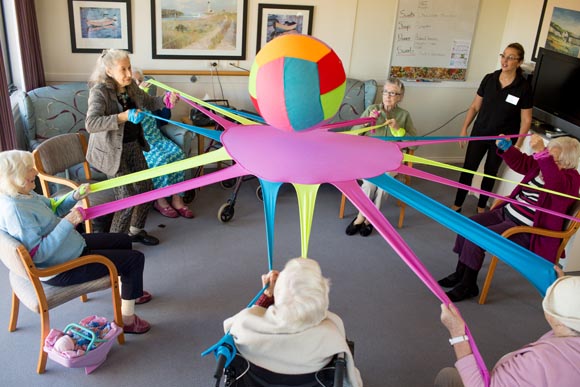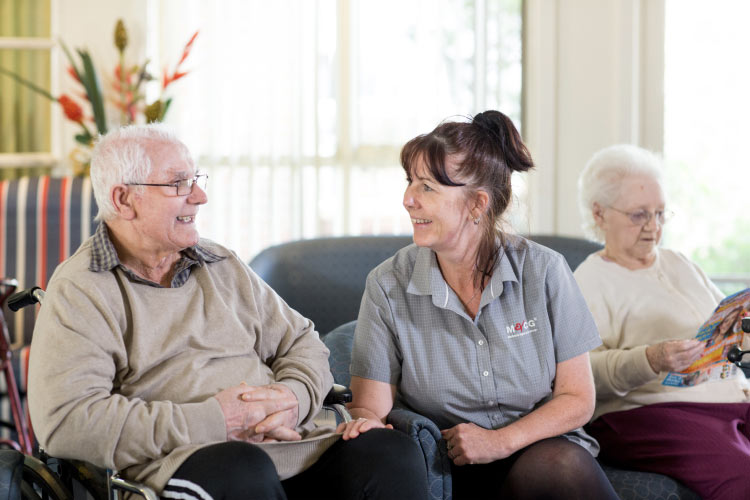I became, in my own mind, part of this family. And they've looked after me with all my needs and it's made me very happy.
A neurological condition is any nervous system disorder affecting movement or the senses. These disorders are common in seniors as their overall health starts to decline as they grow older. MACG offers care homes for neurological conditions while providing constant care and support for residents.
Our skilled nursing facility includes a range of health professionals and specialist nurses who can provide neurological care, mental health support and palliative care if required.
We’re happy to answer any questions you have.
Many neurological disorders will stop a patient from functioning properly. This includes movement, speech, thoughts and more. Often, these conditions worsen over time, and therefore, nursing home residents will require complex care and emotional support. This is what the team at MACG specialises in as we help our patients navigate through their symptoms and provide support for family caregivers.

Tailored support for each resident's neurological condition

We keep core family values at the heart of our organisation

Our services are based on complete honesty and transparency

Our team is continuously training and learning
Here is your guide to understanding aged care home fees.
In every aged care home, a basic daily fee is paid on top of your accommodation cost. This fee covers your basic living needs, including meals, laundry and cleaning, and utility costs like power and telecommunications.
The Australian Government sets a maximum basic daily fee that aged care facilities can charge, currently set at $54.69 a day or $19,961.85 per year.
Services Australia sets this fee at 85% of a single Age Pension. The basic daily fee is the same for everyone (even if they don’t receive an Age Pension) and is increased twice a year, March 20th and September 20th, to match the rising cost of living.
Once you submit an Income and Asset Assessment through Centrelink, you will not only be assessed on whether you are eligible for any subsidies but you’ll also be assessed on whether the means-tested care fee is applicable.
If you have to pay the income-tested care fee, it means the government has determined you need to pay extra towards your day-to-day care, but only if you can afford it. Whether this fee applies to you is dependent on your financial situation and if you have a higher level of assets or income. The means-tested care fee will be between $0 and $259.26 per day.
It can take the government some time to calculate the amount you may need to pay for the means-tested care fee. Therefore, you and the aged care home you choose will be notified by letter when the price has been calculated, and payment will be backdated to the date you entered into care.
All aged care providers can charge fees for your accommodation to cover the home's maintenance costs and amenities. Each nursing home sets this daily accommodation price, and it is advertised clearly in the accommodation cost. At MACG, our daily accommodation rate ranges between $27.62 and $88.55.
Many factors influence aged care accommodation costs, including the room size and type, facilities available and property prices. The Income and Asset Assessment will determine whether the Australian Government will subsidise this fee or fully pay for your accommodation costs based on your income earnings and assets.
Many aged care homes in Melbourne offer additional services, similar to a hotel experience. Some common additional services include beauty and hairdressing, satellite television, internet, gyms, pools, workshops and alcohol.
Some aged care homes may allow you to pick and choose the services you want, so you only pay for what you use, whereas others may have an additional package.
These service fees are set by the aged care provider and aren’t subsidised by the government. Therefore, it’s best to consider these as out-of-pocket costs you will need to cover.
Many aged care homes provide extra services that allow residents to upgrade their stay. Things that may be part of an extra service package include extended menus and drink options, higher quality linens and room furnishings.
Extra services usually come in a bundle and can either apply to specific room types or an entire retirement village. These extra services are not government subsidised.
The government provides a few aged care subsidy programs to assist residents who struggle to afford aged care support. The main program you can apply for is Financial Hardship Assistance. If you are eligible, the Australian Government will assist in paying some or all of your aged care fees (this includes respite care). Find out if you are eligible for Financial Hardship Assistance.
Our priority is to support all residents suffering from a neurological condition and provide the care needed to make life as comfortable as possible. Therefore, we aim to make our services accessible to all by keeping the prices of our aged care facilities affordable. We’ll provide the relevant medical equipment and social support needed to help residents with their neurological disorders. Contact us today to learn more.
Whether a patient requires palliative or respite care, we understand how to handle a neurological disorder in a nursing home. Our team of medical specialists and expert nurses are experienced in implementing support plans beneficial for those suffering from neurological disorders.
We are determined to help all patients live a life in which they are stable and can continue to feel happy and comfortable enough to thrive.
Our aged care homes are equipped with everything needed to live comfortably, especially for those suffering from neurological conditions.




To help residents stay active and healthy, MACG offers various lifestyle and recreational activities.




Residents can volunteer at local community events and give back to a cause that means something to them.




The Income and Asset Assessment is a means test set by the Australian Government to decide if you are eligible for a Commonwealth subsidy for part or all of your aged care home fees.

In this means test, your income and assets are evaluated. What is considered ‘income’ includes but is not limited to financial investments, age, disability or service pensions, income support payments, bonds, shares, your superannuation, family trusts and super funds.
Assets include properties you own (including your own home), investment properties, private or partnered businesses, and more. You will be asked a range of questions regarding your income and assets to determine your eligibility for subsidies.

You can complete the Income and Assets Assessment online through My Aged Care.
The assessment is broken down into three steps and is fairly quick to complete. The same form is used for all support types, whether you’re looking for short or long-term care or support in the home.
To complete the assessment, you will need your Medicare card. You can also organise for a representative to complete the application on your behalf.

The online assessment should not take longer than 20 minutes of your time. However, after submitting the assessment, you will receive a call to arrange a complete evaluation and review of your application.
.jpeg)
There are three different ways you can pay your aged care fees:
MACG’s preferred method of payment is via direct debit. Therefore, a direct debit form will be provided to you during the pre-admissions meeting.
Monthly statements are issued to permanent residents (or their representatives) at the beginning of the month and detail the debit amount. This direct debit is processed on the 15th of every month (bar public holidays or weekends in which the payment will be taken the following business day).
If you have any questions about the admissions process, cost of care, or would like to book a tour, please contact our Admissions Team.

Boronia
Our residents enjoy a warm, homelike atmosphere at the foothills of the Dandenong Ranges.
Carrum Downs
Our residents live happy and fulfilled lives, and we help each person to achieve their best lifestyle.
Narre Warren
Read a good book in front of the warm fireplaces or explore the peaceful, landscaped gardens.
Narre Warren South
Our residents enjoy the beautiful gardens and a range of on-site facilities, including the chicken coop.
Ashwood
In the leafy suburb of Ashwood you will find Grand Cedar Aged Care. See for yourself what makes it special.
Coburg
Residents here appreciate the homelike atmosphere and enjoy the sun in the beautiful outdoor spaces.
Hughesdale
A warm and welcoming environment featuring old-world charm along with modern facilities.
Parkdale
This coastal home features views of Port Philip Bay and courtyards for our residents to enjoy.
Traralgon
Residents cherish the intimate relationships they have with the care team and the wider community.
The most common degenerative neurological disorder seen in the elderly is Alzheimer’s disease. This is a primary form of Dementia that causes damage to the nerve cells of the brain. The most prominent symptom of Alzheimer’s is memory loss and overall mental decline. At MACG, we assist residents suffering from Alzheimer’s with specialised care and recreational activities designed to help them build mental strength.
Caring for someone with a neurological condition is not an easy task. Full-time from family members is often difficult to manage, which is why care homes for neurological conditions are so beneficial. These patients require complex care that involves patience, medical knowledge and emotional support. At MACG, we offer specialised medical care to patients while also allowing them to engage in recreational activities to boost mental strength.
If a resident suffers from a degenerative neurological disorder that has significantly progressed, they may require palliative end-of-life care. At MACG, our aged care homes are equipped with the required equipment and tools to provide appropriate palliative care to patients with extensive neurological disorders. Talk to us today for more information about palliative care and how we handle a neurological disorder in a nursing home.
If you find you’re unable to afford residential aged care costs, there are a number of avenues you can explore for assistance. If your Income and Asset Assessment determines you can’t afford aged care services, the Australian Government can provide subsidies for aged care support.
You may be eligible for Financial Hardship Assistance to partially or fully cover the basic daily fee, means-tested care fee and accommodation costs. Each case is assessed individually and depends on the type of care you need.
You can also consult with a Financial Information Services (FIS) representative. The FIS is an entirely free Australian Government program that helps you make informed decisions about your finances.

If you require assistance or more information, please contact any of the departments below.
You may also wish to gain specialist advice from an Aged Care Financial Planner to restructure your finances to your best advantage when entering care.

If you have any questions about us or our residential aged care homes, we would love to help.